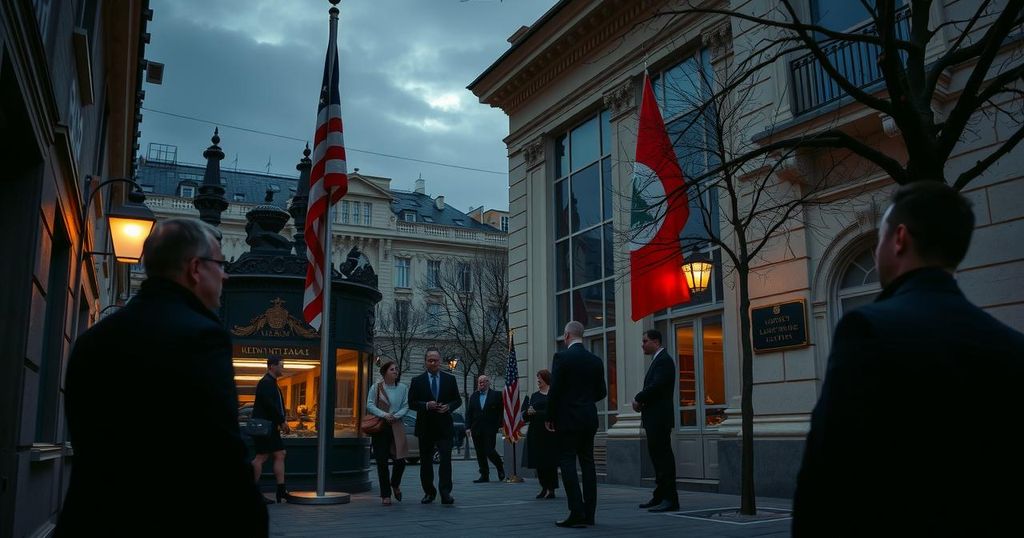U.S. Ambassador Lisa Johnson Advocates for Internal Uprising Against Hezbollah in Lebanon
U.S. Ambassador to Lebanon, Lisa Johnson, is advocating for an internal uprising against Hezbollah amidst the ongoing Israeli conflict. She is urging Lebanese leaders to engage the population for a political shift post-Hezbollah, promoting General Joseph Aoun for presidency and supporting military actions against Hezbollah. Johnson’s approach also seeks to exacerbate sectarian tensions and diminish Hezbollah’s influence, both militarily and politically.
In a recent development reported by Al-Akhbar, Lisa Johnson, the U.S. Ambassador to Lebanon, is actively fostering an agenda aimed at facilitating a shift in Lebanese politics for a post-Hezbollah era. The Ambassador urges Lebanese leaders to mobilize their constituents for an internal uprising against Hezbollah while the group contends with the Israeli military. Johnson has reportedly communicated that Israel cannot secure all its objectives through warfare alone, stating, “it’s time for you to do your part and launch an internal uprising under the banner of ‘Enough.’” Ambassador Johnson emphasized the need for the Lebanese populace to express their ambition to eliminate Hezbollah and return to the political landscape reminiscent of the period following Rafik Hariri’s assassination. She noted that the geopolitical climate currently favors this transition. Moreover, she questioned the apprehensions of Lebanese politicians, asserting that, “Hezbollah has been defeated, its leadership is destroyed, and we are with you, and the entire free world stands by your side.” The Ambassador has also advocated for the election of General Joseph Aoun, the commander of the Lebanese Armed Forces, as Lebanon’s President, asserting that he would appoint a competent leader for the military to combat Hezbollah’s influence, supported by the U.S. and various Arab nations. A concerning aspect of this initiative is the alleged incitement of sectarian tensions in areas hosting displaced persons, particularly Shia refugees, as these operations are reportedly being conducted in neighborhoods controlled by the Lebanese Forces, a right-wing Christian party. Additionally, Johnson’s strategy includes attempts to create a rift between Hezbollah and the Shia community. She has made it clear that the ultimate goal is to undermine Hezbollah’s influence entirely—both militarily and politically. The Ambassador conveyed her firm commitment to dismantling not only Hezbollah’s operational capacities but also its support networks, stating, “We do not only want to limit Hezbollah’s influence, but we will strike its support lines, and we are working non-stop to bring down the regime in Iran as well.”
The context of Ambassador Lisa Johnson’s activities in Lebanon originates from the historically complex and delicate socio-political fabric of the nation. Lebanon’s society is characterized by its multi-confessional nature, comprising Christians, Muslims, Druze, and numerous refugees. The historical backdrop includes the devastating Lebanese Civil War, which lasted from 1975 to 1990, leading to significant loss of life and ongoing sectarian tensions. Given these realities, external influences, particularly from the U.S., can easily exacerbate existing divisions and challenges to stability in the region, especially concerning Hezbollah’s significant standing among the Shia population.
In summary, the actions and statements made by Ambassador Lisa Johnson reflect a broader strategy by the United States to reshape Lebanon’s political landscape to diminish Hezbollah’s power. This involves fostering internal dissent against the group while capitalizing on current geopolitical circumstances. Furthermore, the potential repercussions of these actions on Lebanon’s multifaceted society raise serious concerns, as any miscalculation could lead to increased sectarian conflict and instability.
Original Source: mronline.org




Post Comment